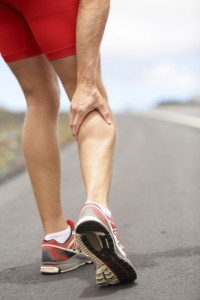Most runners have experienced it: your run is going smoothly and you’re feeling great, then all of a sudden you succumb to the dreaded side stitch, calf cramp or that feeling of “having to go.” Muscle and stomach issues can stop a runner dead in their tracks. With varying spring temperatures, muscle cramps are more common, as there is little opportunity to adjust to the change in weather.
Even with all advances in modern science, the true cause of exercise-induced cramps is still widely misunderstood. Kate Davis, MS, RD, CSSD, LDN, consultant sports dietitian/nutritionist and owner of RDKate Sports Nutrition in Naperville, Illinois provides great insight regarding why cramps may occur while running. Kate has had numerous experiences working with institutions like the University of Michigan and Michigan State University, as well as the Olympic Training Center in Colorado Springs, CO and IMG Academy in Bradenton, FL. Check out what she had to say below to learn how to minimize, prevent, and act quickly when cramps occur.
JB: In your experience as a nutritionist/dietitian, what is your advice on how to prevent stomach cramps when running? What about muscle cramps?KD: In my experience, stomach cramping during runs is typically either caused by too much nutrition (i.e. gels, sports drinks) too quickly or dehydration (the runs). With that said, runners are able to train the stomach just like muscles. Therefore, if you think you took on too much nutrition, back off and go slow. You can also try switching to a different product. If you feel like you have to go to the bathroom during long runs, increase your fluid intake before your run and in the early part of your run.
Muscle cramping, on the other hand, can be caused by a myriad of culprits including poor training tactics, poorly fitted shoes, inadequate stretching and nutrition. This blog focuses on nutrition, specifically dehydration as a common cause:
Dehydration
- Dehydration is caused by a lack of electrolytes. Electrolytes are what help muscles contract, relax and retain more fluid to stay hydrated.
- If you are a heavy sweater or prone to muscle cramping in the past, work on increasing your intake of fluids that contain electrolytes during your run.
- Options to stay hydrated include: a regular sports drink, a low sugar sports drink or simply an electrolyte supplement combined with water.
- If you chronically follow a low-carbohydrate diet, you may want to choose a sports drink. This provides your muscles with needed exercise-fueling carbohydrates that assist with cramping prevention.
- Bananas
- Runners most likely benefit from the high potassium content (potassium is an electrolyte).
- Pickle Juice
- Pickle juice contains a high concentration of sodium (another electrolyte).
- Formulated Products (highly recommend)
- Sports drinks or properly formulated electrolyte supplements for muscle cramp prevention
- This option provides a more balanced and research-based quantity of electrolytes compared to individual foods.
It might seem like your run is in jeopardy when you succumb to a cramp, but if you take Kate’s advice, you can help prevent it from happening. If a cramp does occur during a run, try slowing down to a walk or reaching your arm above your head on the affected side. Hopefully you never have to experience a dreaded cramp or side-stitch any time soon!
Your Nutrition Coach,
RDKate
This post originally appeared here: http://www.athletico.com/2016/04/29/runners-cramps-why-you-get-them-how-you-prevent-them/

No comments:
Post a Comment